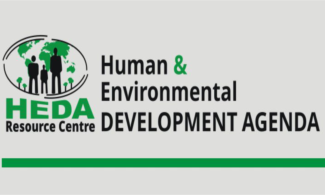
The Nigerian government had secured $800 million from the World Bank for cash handouts to the poor as part of efforts to end a costly fuel subsidy by June.
The Human and Environmental Development Agenda (HEDA Resource Center) has accused the World Bank of setting a loan trap for Nigeria with $800 million funding.
The Nigerian government had secured $800 million from the World Bank for cash handouts to the poor as part of efforts to end a costly fuel subsidy by June.
However, HEDA strongly criticised the World Bank Country office in Nigeria, for its engagement with practices that were considered illegal under Nigeria’s legal regime, relating to borrowing and indebtedness.
The group argued that the loan represented an indebtedness trap agenda for Nigeria and condemned the World Bank's approach to addressing poverty alleviation.
This was contained in a statement signed by HEDA’s Chairman, Olanrewaju Suraju, on Wednesday, noting that the organisation expressed concerns over the loan's intentions.
The statement partly reads; "The Human and Environmental Development Agenda (HEDA Resource Center) has strongly criticised the World Bank Country office in Nigeria, for its engagement with practices that is considered illegal under Nigeria’s legal regime, relating to borrowing and indebtedness.
"This goes to confirm the loan and indebtedness was all along World Bank idea and agenda and not that of a government that is with less than a month in office. As CSOs, we have no other duty than to condemn the loan, World Bank and the FG on this corruption perfection strategy of loan and poverty elongation tagged alleviation.
"The Bank in its engagement with some Civil Society Organisations regarding the planned $800 million loan to the Nigerian Government from the World Bank is subject to the approval of the National Assembly of Nigeria before its disbursement will take effect. HEDA argues that the loan represents an indebtedness trap agenda for Nigeria and condemns the World Bank's approach to addressing poverty alleviation.
"The Financial Responsibility Acts, 2007 prohibits any Government agent or institution from borrowing for recurrent expenditure and this fact is known to the World Bank, as a global financial institution. Financial Responsibility Act 2007, Section 44 (1)(a) States that, “Government at al tiers shall only borrow for capital expenditure and human development, provided that, such borrowing shall be on concessional terms with low interest rate and with a reasonable long amortization period subject to the approval of the appropriate legislative body where the necessary;”. Section 44 (3) further states that, “Non-compliance with the provisions of this section shall make the action taken an offence.
"The World Bank should focus on assisting Nigeria in becoming self-sufficient in fuel production instead of perpetuating importation dependency.”
Suraju criticised the loan, stating, "The World Bank is supposed to get Nigeria out of fuel importation by assisting the country to make refineries work or build new refineries and get us out of importation of fuel. World Bank is only encouraging us to remain importation dependent and provide a market for countries selling refined petroleum to us. This loan is a trap and nothing more."
The Civil Society Organisation’s criticism raises concerns about the loan's potential impact on Nigeria's long-term economic stability and self-reliance.
The organisation urges the World Bank to reconsider its approach and prioritize investments that promote self-sufficiency, such as revitalizing domestic refineries or constructing new ones, rather than perpetuating importation reliance.
As Nigeria grapples with socio-economic challenges, HEDA’s call to focus on sustainable solutions reflects a broader concern among civil society organizations regarding the loan's effectiveness in achieving long-term development goals.